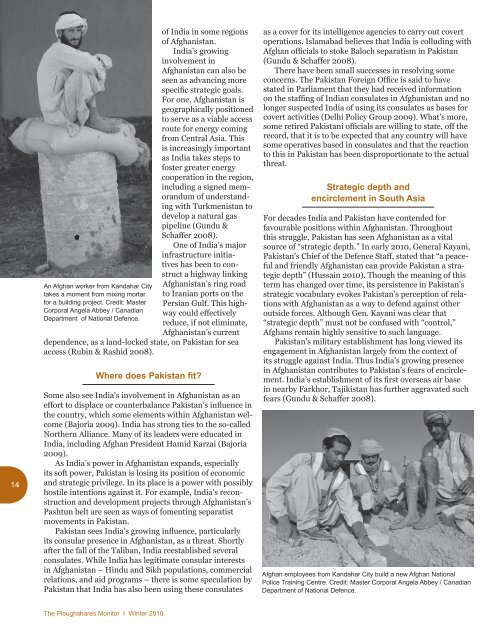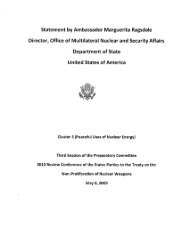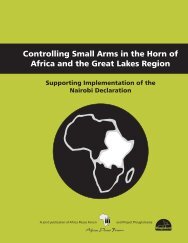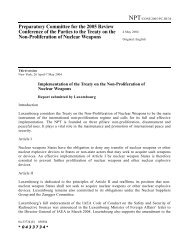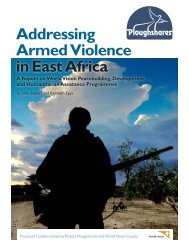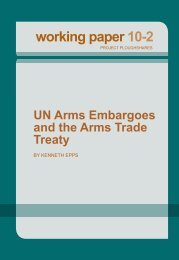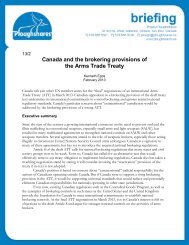Winter 2010 - Project Ploughshares
Winter 2010 - Project Ploughshares
Winter 2010 - Project Ploughshares
You also want an ePaper? Increase the reach of your titles
YUMPU automatically turns print PDFs into web optimized ePapers that Google loves.
14An Afghan worker from Kandahar Citytakes a moment from mixing mortarfor a building project. Credit: MasterCorporal Angela Abbey / CanadianDepartment of National Defence.of India in some regionsof Afghanistan.India’s growinginvolvement inAfghanistan can also beseen as advancing morespecific strategic goals.For one, Afghanistan isgeographically positionedto serve as a viable accessroute for energy comingfrom Central Asia. Thisis increasingly importantas India takes steps tofoster greater energycooperation in the region,including a signed memorandumof understandingwith Turkmenistan todevelop a natural gaspipeline (Gundu &Schaffer 2008).One of India’s majorinfrastructure initiativeshas been to constructa highway linkingAfghanistan’s ring roadto Iranian ports on thePersian Gulf. This highwaycould effectivelyreduce, if not eliminate,Afghanistan’s currentdependence, as a land-locked state, on Pakistan for seaaccess (Rubin & Rashid 2008).Where does Pakistan fit?Some also see India’s involvement in Afghanistan as aneffort to displace or counterbalance Pakistan’s influence inthe country, which some elements within Afghanistan welcome(Bajoria 2009). India has strong ties to the so-calledNorthern Alliance. Many of its leaders were educated inIndia, including Afghan President Hamid Karzai (Bajoria2009).As India’s power in Afghanistan expands, especiallyits soft power, Pakistan is losing its position of economicand strategic privilege. In its place is a power with possiblyhostile intentions against it. For example, India’s reconstructionand development projects through Afghanistan’sPashtun belt are seen as ways of fomenting separatistmovements in Pakistan.Pakistan sees India’s growing influence, particularlyits consular presence in Afghanistan, as a threat. Shortlyafter the fall of the Taliban, India reestablished severalconsulates. While India has legitimate consular interestsin Afghanistan – Hindu and Sikh populations, commercialrelations, and aid programs – there is some speculation byPakistan that India has also been using these consulatesas a cover for its intelligence agencies to carry out covertoperations. Islamabad believes that India is colluding withAfghan officials to stoke Baloch separatism in Pakistan(Gundu & Schaffer 2008).There have been small successes in resolving someconcerns. The Pakistan Foreign Office is said to havestated in Parliament that they had received informationon the staffing of Indian consulates in Afghanistan and nolonger suspected India of using its consulates as bases forcovert activities (Delhi Policy Group 2009). What’s more,some retired Pakistani officials are willing to state, off therecord, that it is to be expected that any country will havesome operatives based in consulates and that the reactionto this in Pakistan has been disproportionate to the actualthreat.Strategic depth andencirclement in South AsiaFor decades India and Pakistan have contended forfavourable positions within Afghanistan. Throughoutthis struggle, Pakistan has seen Afghanistan as a vitalsource of “strategic depth.” In early <strong>2010</strong>, General Kayani,Pakistan’s Chief of the Defence Staff, stated that “a peacefuland friendly Afghanistan can provide Pakistan a strategicdepth” (Hussain <strong>2010</strong>). Though the meaning of thisterm has changed over time, its persistence in Pakistan’sstrategic vocabulary evokes Pakistan’s perception of relationswith Afghanistan as a way to defend against otheroutside forces. Although Gen. Kayani was clear that“strategic depth” must not be confused with “control,”Afghans remain highly sensitive to such language.Pakistan’s military establishment has long viewed itsengagement in Afghanistan largely from the context ofits struggle against India. Thus India’s growing presencein Afghanistan contributes to Pakistan’s fears of encirclement.India’s establishment of its first overseas air basein nearby Farkhor, Tajikistan has further aggravated suchfears (Gundu & Schaffer 2008).Afghan employees from Kandahar City build a new Afghan NationalPolice Training Centre. Credit: Master Corporal Angela Abbey / CanadianDepartment of National Defence.The <strong>Ploughshares</strong> Monitor I <strong>Winter</strong> <strong>2010</strong>


